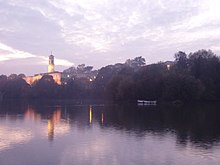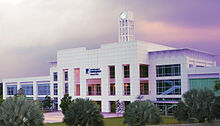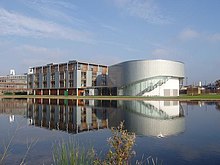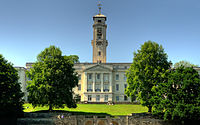University of Nottingham: Difference between revisions
| Line 98: | Line 98: | ||
*2008: Sunday Times 10 year average ranking (8th)<ref>http://extras.timesonline.co.uk/pdfs/univ07ten.pdf, retrieved 2008-10-01</ref> |
*2008: Sunday Times 10 year average ranking (8th)<ref>http://extras.timesonline.co.uk/pdfs/univ07ten.pdf, retrieved 2008-10-01</ref> |
||
*2007: World Ranking of Universities (9th in UK)<ref name="ARWU2007" /> |
*2007: World Ranking of Universities (9th in UK)<ref name="ARWU2007" /> |
||
{| class="wikitable" |
|||
|+UK |
|||
|- |
|||
! |
|||
! 2008 |
|||
! 2007 |
|||
! 2006 |
|||
! 2005 |
|||
|- |
|||
! Times Good University Guide |
|||
| 19<sup>th</sup><ref>{{cite web |url=http://extras.timesonline.co.uk/gug/gooduniversityguide.php |title=The Times Good University Guide 2008|work=[[The Times]]|accessdate=03-11-2007}}</ref> |
|||
| 14<sup>th</sup><ref>{{cite web |url=http://www.timesonline.co.uk/displayPopup/0,,102571,00.html |title=The Times Good University Guide 2007 - Top Universities 2007 League Table|work=[[The Times]]|accessdate=03-11-2007}}</ref> |
|||
| |
|||
| 16<sup>th</sup><ref>{{cite web |url=http://www.timesonline.co.uk/displayPopup/0,,32607,00.html |title=The Times Top Universities |work=[[The Times]]|accessdate=03-11-2007}}</ref> |
|||
|- |
|||
! Guardian University Guide |
|||
|19<sup>th</sup><ref name="Guardian 2008">{{cite web |url=http://browse.guardian.co.uk/education?SearchBySubject=&FirstRow=29&SortOrderDirection=&SortOrderColumn=GuardianTeachingScore&Subject=University+ranking&Institution= |title=University ranking by institution |work=[[The Guardian]]|accessdate=29-10-2007}}</ref> |
|||
| |
|||
|11<sup>th</sup><ref name="Guardian 2006">{{cite web |url=http://browse.guardian.co.uk/education/2006?SearchBySubject=&FirstRow=20&SortOrderDirection=&SortOrderColumn=GuardianTeachingScore&Subject=Institution-wide&Institution= |title=University ranking by institution |work=[[The Guardian]]|accessdate=29-10-2007}}</ref> |
|||
|15<sup>th</sup><ref name="Guardian 2005">{{cite web |url=http://education.guardian.co.uk/universityguide2005/table/0,,-5163901,00.html?start=40&index=3&index=3 |title=University ranking by institution |work=[[The Guardian]]|accessdate=29-10-2007}}</ref> |
|||
|- |
|||
! Sunday Times University Guide |
|||
| 15<sup>th</sup><ref name="Sunday_times 2008">{{cite web |url=http://extras.timesonline.co.uk/stug/universityguide.php |title=The Sunday Times Good University Guide League Tables |work=[[The Sunday Times]]|accessdate=03-11-2007}}</ref> |
|||
| |
|||
| 12<sup>th</sup><ref name="Sunday_times 2006/05">{{cite web |url=http://extras.timesonline.co.uk/stug2006/stug2006.pdf |title=The Sunday Times University League Table |work=[[The Sunday Times]]|accessdate=03-11-2007}}</ref> |
|||
| 11<sup>th</sup><ref name="Sunday_times 2006/05">{{cite web |url=http://extras.timesonline.co.uk/stug2006/stug2006.pdf |title=The Sunday Times University League Table |work=[[The Sunday Times]]|accessdate=03-11-2007}}</ref> |
|||
|- |
|||
! Daily Telegraph |
|||
| |
|||
|14<sup>th</sup><ref name="Telegraph 2006">{{cite web |url=http://www.telegraph.co.uk/news/main.jhtml;jsessionid=HXFCSGXMNVABTQFIQMFCFGGAVCBQYIV0?xml=/news/2007/07/30/ncambs430.xml |title= University league table |work=[[The Daily Telegraph]]|accessdate=29-10-2007}}</ref> |
|||
| |
|||
| |
|||
|} |
|||
{| class="wikitable" |
|||
|+World |
|||
|- |
|||
! |
|||
! 2007 |
|||
! 2006 |
|||
! 2005 |
|||
|- |
|||
! THES - QS World University Rankings |
|||
| |
|||
| 85<sup>th</sup><ref>{{cite web |url=http://www.topuniversities.com/worlduniversityrankings/results/2006/overall_top_200_full_details/ |title = THES - QS World University Rankings 2006 |work=[[THES]]|accessdate=03-11-2007}}</ref> |
|||
| 97<sup>rd</sup><ref>{{cite web |url=http://www.topuniversities.com/worlduniversityrankings/results/2005/top_200_universities/ |title = THES - QS World University Rankings 2005 |work=[[THES]]|accessdate=03-11-2007}}</ref> |
|||
|- |
|||
! Academic Ranking of World Universities |
|||
| 81<sup>st</sup><ref>[http://ed.sjtu.edu.cn/rank/2007/ARWU2007FullListByRank.pdf Academic Ranking of World Universities by Shanghai Jiao Tong University 2007]</ref> |
|||
| 79<sup>th</sup><ref>[http://ed.sjtu.edu.cn/rank/2006/ARWU2006FULLLIST-BY%20RANK%20(PDF).pdf Academic Ranking of World Universities by Shanghai Jiao Tong University 2006]</ref> |
|||
| 83<sup>rd</sup><ref>[http://ed.sjtu.edu.cn/rank/2005/ARWU2005FullList2.pdf Academic Ranking of World Universities by Shanghai Jiao Tong University 2005]</ref> |
|||
|} |
|||
===World rankings=== |
===World rankings=== |
||
Revision as of 18:17, 16 November 2008
| File:Nottingham shield.png | |
| Motto | Template:Lang-la |
|---|---|
Motto in English | A city is built on wisdom |
| Type | Public |
| Established | 1798 (became a London university college 1881, separated from University of London 1948) |
| Endowment | £28.4 million[1] |
| Chancellor | Professor Fujia Yang |
| Vice-Chancellor | Professor David Greenaway |
| Visitor | The Lord President of the Council ex officio |
| Students | 33,550[2] |
| Undergraduates | 24,355[2] |
| Postgraduates | 9,195[2] |
| Location | , 52°56′20″N 1°11′49″W / 52.939°N 1.197°W |
| Campus | University Park, Jubilee Campus, Sutton Bonnington Campus, King's Meadow Campus, Queen's Medical Centre Hospital Campus, City Hospital Campus, Ningbo Campus (China), Semenyih Campus (Malaysia) |
| Colours | Green and Gold |
| Affiliations | Russell Group[3] Universitas 21[4] ACU EUA |
| Website | http://www.nottingham.ac.uk/ |
The University of Nottingham is a public, co-educational institution of higher learning in the city of Nottingham, England. Nottingham, which has campuses in the United Kingdom and Asia, is the fifth largest university in the UK (as measured by numbers of students), and is a member of the Russell Group, Universitas 21, the Association of Commonwealth Universities, and the European University Association.[5][6][7]
History
The University of Nottingham traces its origins to the founding of an adult education school in 1798. The foundation stone of the original University College Nottingham on Shakespeare Street was laid in 1877, with a speech by former UK prime minister, William Ewart Gladstone.[8] This building was formally opened in 1881 by Prince Leopold, Duke of Albany.[8] A large gift of land allowed University College Nottingham to move to a new campus in 1928. This development was supported by an endowment fund and public contributions. The transfer was made possible by the generosity of Sir Jesse Boot, who presented 35 acres to the City of Nottingham in 1921.[9] Boot, later named Lord Trent, hoped the move would solve the problems facing University College Nottingham in its restricted Shakespeare Street building. Boot stipulated that while part of the Highfields site, lying southwest of the city, be devoted to the University College Nottingham, the rest should provide a place of recreation for the residents of the city. In the 1920s, the University Boulevard was created, as well as and the landscaping of the lake and public park. Initially, University College Nottingham was accommodated within one major new building named Trent Building. Designed by Morley Horder, Trent Building’s construction was one of the largest building projects in the city of Nottingham in the 1920s.[8] By 1934 the students of Nottingham had organised societies such as the Walking club. In 1948, University College Nottingham received its Royal Charter, which gave it the title of "university" and the power to confer degrees.[10] The name changed from University College Nottingham to The University of Nottingham. Previously, the institution's students received their degrees from the University of London.
Over time, Nottingham has undergone steady expansion. In the 1940s, the Midlands Agricultural and Dairy College at Sutton Bonington merged with Nottingham; in 1970, the university established the UK's first medical school in the 20th century.[8] In 1999, a new Jubilee Campus was opened on the former site of the Raleigh Bicycle Company, one mile away from the University Park Campus. Nottingham then began to expand overseas, opening a campus in Malaysia and China in 1999 and 2004, respectively. In 2005, the King’s Meadow Campus opened near the University Park Campus.

Nottingham has used several logos throughout its history. Initially, Nottingham's coat of arms with the cross, book, and towers was used and is still used in books owned by the university’s various libraries. Later, Nottingham adopted a simpler logo, in which a stylised version of Nottingham Castle was surrounded by the text "The University of Nottingham". In 2001, Nottingham undertook a major rebranding exercise, including discontinuing this logo and replacing it with the current one (with the text to the right of the stylised castle).
Organisation

The chief officer of Nottingham is the Chancellor, elected by the University Court on the recommendation of the University Council.[11] The chief academic and administrative officer of Nottingham is the vice-chancellor who is assisted by six pro-vice chancellors.[11] Nottingham's governing body is the University Council, which has 35 members, mostly non-academic.[11] Nottingham's academic authority is the Senate, consisting of senior academics of Nottingham and elected staff and student representatives.[11] Nottingham's largest forum is the University Court, presided over by the chancellor.[11] Nottingham's current Chancellor and President is Professor Fujia Yang; its Vice-Chancellor is Sir Colin Campbell. Sir Colin has announced his retirement beginning September 2008: his position will be filled by Professor David Greenway.[12]
Campuses

UK campuses
University Park Campus, to the west of the Nottingham city centre, is the principal campus of Nottingham and has been regarded as one of the most attractive in the UK.[13][14] Nottingham has several additional campuses, all of which share similar design features to the original, being "garden campuses" situated around a lake with extensive greenery (with the exception of Sutton Bonington campus, which predates the creation of University Park Campus).
Jubilee Campus, designed by Sir Michael Hopkins, was opened by Queen Elizabeth II in 1999 and is one mile away from University Park. Following the purchase and demolition of the old Raleigh bicycle factory, Nottingham intends to undertake further expansion of the campus with buildings designed by Ken Shuttleworth.
The City Hospital Campus is located near Bestwood and houses staff and postgraduate students specialising in respiratory medicine, stroke medicine, oncology, physiotherapy, and public health. The campus will be expanded in 2009 to house a new institute of public health and a specialist centre for tobacco research.
Sutton Bonington Campus houses Nottingham's School of Biosciences and the new School of Veterinary Medicine and Science and is located about 20 kilometres (12 miles) to the south of the City of Nottingham, between the M1 motorway, Ratcliffe power station, and the Midland Main Line railway.
King’s Meadow Campus was established in 2005 on the former Carlton Studios site on Lenton Lane. This campus mainly accommodates the administrative functions of Nottingham but also the Department of Manuscripts and Special Collections. A functioning television studio remains at the site that Nottingham continues to rent to the film and television industry.

International campuses
The Malaysia campus is situated in Semenyih, a short distance from Kuala Lumpur, Malaysia's capital. The Ningbo, China campus is located in the city of Ningbo, in the Zhejiang province of China.
Academics
Faculties and Schools
Nottingham is divided into five faculties and multiple schools of study.[15]
- Faculty of Arts
- Faculty of Engineering
- Faculty of Medicine and Health Sciences
- Faculty of Science
- Faculty of Social Sciences, Law, and Education
In 2006, Nottingham was named the UK's "University of the Year" by The Times Higher Education Supplement.[16]
Research

Much of the pioneering work on Magnetic Resonance Imaging (MRI) was carried out at Nottingham, work for which Nottingham professor Sir Peter Mansfield received the Nobel Prize for Medicine and Physiology in 2003. Nottingham remains a strong centre for research into MRI and its 7 tesla scanner required 213 tonnes of iron cladding to prevent the surrounding area being affected by its powerful field.[17] Nottingham has contributed to a number of other significant scientific advances. Professor Frederick Kipping, Professor of Chemistry (1897-1936), made the discovery of silicone polymers at Nottingham (but failed to realise the commercial significance of what is now a multi-billion pound industry). Major developments in the in vitro culture of plants and micropropogation techniques were made by plant scientists at Nottingham, along with the first production of transgenic tomatoes by Professor Don Grierson in the 1980s. Other innovations at the university include cochlear implants for deaf children and the brace-for-impact position used in aircraft. Other facilities at Nottingham include the UK's 109th most powerful supercomputer.[18]

Nottingham had 26 departments rated 5 or 5* (internationally excellent) in the UK Funding Councils' 2001 Research Assessment Exercise.[19] Nottingham was among the top four UK universities in receiving research funding from private industry and commerce.[20] In the 2005–2006 academic year, Nottingham's research funds totalled a record £122 million.[21] Nottingham is a key partner in the UK Government's designation of the city of Nottingham as a "Science City".
Graduate School
Nottingham's Graduate School was established in 1994, and operates a Graduate School Centre, which contains a social space, meeting rooms and a seminar room. The Graduate School was originally housed in the Biology Building but moved to the Trent Building in 2006. The school offers a wide range of short courses aimed to help the development of post graduate students including courses in information technology and communication skills.[22]
Rankings and reputation
UK League Table Rankings
The university was named the Times Higher Education "University of the year" in 2006 and since British League table rankings began in 1992 has consistently ranked amongst Britains top ten leading universities, recently finishing 8th in the Sunday Times 10 year average ranking [23]. Entry into Nottingham is extremely competitive, traditionally having one of the highest application per place ratios of any university in the country, and with new undergraduates averaging a UCAS tariff score well north of 400 (over AAA at A-Level).[24] [25] Nottingham has experinced a rapid and successful climb up the pecking order of Great Britain's higher education system over the past two decades according to the influential The Times Good University Guide, going in less than twenty years "from being a solid civic university to a prime alternative to oxbridge".[26] The University has mirrored this success abroad with a rapid rise in international rankings, firmly establishing itself amongst the top 75 universities in the world and top 25 in Europe.[27] The University is also "one of the most employer friendly universities in the world" according to Virgin Alternative Guide to British Universities, ranking amongst the top 20 most targeted universities in the world by leading employers in the THES world rankings,[28] and in the 2008 Times High Fliers survey being named in the top 3 most targeted British universities by leading graduate recruiters.[29]
UK rankings 2008
- 2009: Good University Guide (16th)[30]
- 2008: Sunday Times University Guide (13th)
- 2008: Sunday Times 10 year average ranking (8th)[31]
- 2007: World Ranking of Universities (9th in UK)[27]
World rankings
- 2007: Times Higher Education – Quacquarelli Symonds World University Rankings (top 100 universities) (70th)[32]
- 2007: Academic Ranking of World Universities (top 500 universities) (81st)[33]
Enrolment and student life
According to the latest statistics compiled by the Higher Education Statistics Agency, Nottingham is the UK's fifth largest university based on total student enrollment.[2] Nottingham has more than 6,000 international undergraduate and postgraduate students from more than 130 countries.[34]
Students' Union
The University of Nottingham Students' Union is heavily involved with providing student activities at the university and has more than 150 student societies affiliated with it. A further 72 clubs are affiliated to the Students' Union’s Athletic Union. Nottingham participates yearly in the Varsity Series, a number of sporting events between the students and staff of the university and traditional rivals Nottingham Trent University. In 2008 the Students' Union won the Participation Award at the NUS Awards for significantly increasing the participation levels of student members.

The student magazine Impact is published regularly in term time. A range of student theatre takes place at Nottingham’s New Theatre. The Students’ Union runs two sound and lighting companies. TEC PA & Lighting provides services for many student events such as summer parties, Fresher’s Address and many other society events at the University Park and Jubilee campuses. The Union also boasts Europe's largest and most successful student-run RAG organisation 'Karnival' (or Karni), which raised almost £688,500 in 2007 for a host of good causes.[35] The University Radio Station is the URN/Student Radio for Nottingham which has won more awards than any other at the Student Radio Awards, including Station of the Year in 2008.
The Student's Union also organise a number of activities and events involving students and staff with the local community. Student Community Action sees more than 600 students each year volunteering in local schools and community organisations, as well as a wide range of other projects throughout the city of Nottingham. Nottingham's Active Communities initiative coordinated with the Student's Union to set up the Crocus Cafe in nearby Lenton. This cafe provides a meeting place for both students and local residents where they can sit over a Fair Trade cup of coffee and organic, vegetarian food.
Students in Free Enterprise (SIFE)
The SIFE team from the University of Nottingham have won the SIFE United Kingdom National Competition for four consecutive years. Based at the Nottingham University Business School. SIFE Nottingham are the 2005, 2006, 2007 and 2008 national champions. They have competed at SIFE World Cups in Toronto, Paris, New York City and in October 2008 will be showcasing their projects in Singapore.
Campus 14
Campus 14 is a bar crawl of the 12 hall bars on the University Park campus and the Student Union bars. Campus 14 is a well-known campus tradition, despite having been officially banned by Nottingham in 2001.[36]
Student accommodation
Nottingham's accommodation provides more than 6,000 rooms, owned by the university or provided by external developers, all close to the campuses and ranging from modern self-catering flats to traditional halls of residence.[37] Catered halls of residence provide a more "home from home" service. Fifteen halls, housing about 4,000 students across the University Park, Jubilee, and Sutton Bonington campuses, are owned and managed by Nottingham. Three meals a day are provided as part of the accommodation fee with a varied menu catering for various dietary requirements. Nottingham's accommodation features rooms on each campus that are accessible to students with disabilities, including larger rooms for extra storage or work space, adapted bathrooms and facilities for those with hearing impairments.
Controversies

Nottingham attracted controversy in 2001 when it accepted £3.8 million from British American Tobacco for the creation of a centre of corporate social responsibility.[38] This donation caused Professor Richard Smith, editor of the British Medical Journal to resign from his post as professor at Nottingham. The tobacco company funds were donated to establish an International Centre for Corporate Social Responsibility at Nottingham University Business School, which in 2007, was ranked 1st in the UK, 4th in Europe, and 28th in the world in the Master of Business Administration (MBA) rankings compiled by the Aspen Institute, whose biennial table highlights full-time MBA programmes that integrate ethical, social, and environmental issues.[39] Despite predictions that medical research income and cancer studies would be affected adversely in the long-term at Nottingham, funding for cancer research has been robust in recent years, with significant public-private projects on breast and lung cancer in the laboratory of Professor John Robertson, as well as a successful bid in 2008 to establish a UK centre for Tobacco Control Studies under the leadership of Professor John Britton.[40]
As a distributed university, the parity of course structure and equivalence between the various Nottingham campuses has raised some controversy, particularly over the MBA held at the Malaysian Campus.[41]
Anti-terror raids
On 14 May 2008 Hicham Yezza and Rizwaan Sabir were arrested at the University Park Campus and detained for six days under the Terrorism Act 2000.[42][43] They were both released without charge after six days, but Yezza was rearrested on unrelated immigration matters and detained for 31 days. He is currently on bail and his court case is in procession.
Notable alumni
The most celebrated alumnus of Nottingham is probably the novelist D. H. Lawrence. Nottingham has particularly strong links with Malaysia. Two Malaysian kings, as well as several Malaysian government ministers are graduates. Other prominent alumni include 2003 Nobel laureate Sir Clive Granger, 12 current members of the UK Parliament and numerous executives on the boards of top multi-national corporations.
See also
- Academic dress of the University of Nottingham
- China Policy Institute
- Institute of Contemporary Chinese Studies
- Nottingham University Press
- Third oldest university in England debate
- Rizwaan Sabir - Nottingham University postgraduate student arrested on campus under the Terrorism Act 2000
References
- ^ "http://www.nottingham.ac.uk/finance/fin_stats_2006.pdf" (PDF). Retrieved 2007-04-13.
{{cite web}}: External link in|title= - ^ a b c d "Table 0a - All students by institution, mode of study, level of study, gender and domicile 2006/07" (Microsoft Excel spreadsheet). Higher Education Statistics Agency. Retrieved 2008-04-11.
- ^ "The Russell Group". Retrieved 2007-11-10.
- ^ "The University of Nottingham". Universitas 21. Retrieved 2007-11-10.
{{cite web}}: External link in|work= - ^ Higher Education Statistics Agency, Retrieved 2008-06-13.
- ^ Association of Commonwealth Universities, Retrieved 2008-06-24.
- ^ European University Association, Retrieved 2008-6-24.
- ^ a b c d "A Brief History of the University". University of Nottingham. Retrieved 2008-10-05.
- ^ History of The University of Nottingham, Retrieved on 2008-06-13.
- ^ History of The University of Nottingham, Retrieved on 2008-06-13.
- ^ a b c d e "How the University works". University of Nottingham. Retrieved 2008-10-05.
- ^ University of Nottingham: Press Release, Retrieved 2008-06-13.
- ^ "360° tour - The University of Nottingham - University Park campus". BBC. Retrieved 2007-05-12.
- ^ "University profiles: University of Nottingham". The Guardian. 2007-05-01. Retrieved 2007-05-12.
- ^ The University of Nottingham Faculties, Retrieved 2008-06-13.
- ^ The University of Nottingham Press Release, Retrieved 2008-06-13.
- ^ "Giant magnet drops in on campus". University of Nottingham. 2004-11-23. Retrieved 2007-12-17.
- ^ "TOP500 List - June 2005 (101-200)". Top500.
{{cite web}}: External link in|work=|accessdaymonth=ignored (help); Unknown parameter|accessyear=ignored (|access-date=suggested) (help) - ^ BBC News, Retrieved on 2008-06-13.
- ^ The University of Nottingham: Business and Industry, Retrieved on 2008-06-13.
- ^ The University of Nottingham: Research Excellence (RAE), Retrieved on 2008-06-13.
- ^ Graduate School Roadmap
- ^ http://extras.timesonline.co.uk/pdfs/univ07ten.pdf, retrieved 2008-10-01
- ^ http://www.nottingham.edu.my/News/News/Documents/2000/Nottingham%20remains%20in%20UK%20Top%20Ten.pdf
- ^ http://www.nottingham.edu.my/News/News/Documents/2004/040912-The%20Sunday%20Times%20University%20Guide%202004.doc
- ^ http://www.timesonline.co.uk/tol/life_and_style/education/good_university_guide/article2166914.ece
- ^ a b "Top 100 European Universities". Academic Ranking of World Universities 2007. Shanghai Jiao Tong University. 2007. Retrieved 2008-10-05.
- ^ http://www.topuniversities.com/worlduniversityrankings/results/2007/criteria/employer_review/
- ^ http://www.nottingham.ac.uk/about/league-table.php
- ^ The Good University Guide, Retrieved 2008-06-13.
- ^ http://extras.timesonline.co.uk/pdfs/univ07ten.pdf, retrieved 2008-10-01
- ^ Times Higher Education – Quacquarelli Symonds World University Rankings, Retrieved 2008-06-13.
- ^ Academic Ranking of World Universities, Retrieved 2008-06-13.
- ^ University of Nottingham: International Students, Retrieved 2008-06-23.
- ^ Karnival 2008, Retrieved 2008-06-13.
- ^ "Campus 14 Banned". 2008-01-23. Retrieved 2008-01-23.
{{cite web}}: Text "publisher Open Guides" ignored (help) - ^ University of Nottingham: Accommodation, Retrieved 2008-6-23.
- ^ BBC News, Retrieved 2008-06-23.
- ^ Beyond Grey Pinstripes, Retrieved 2008-06-13.
- ^ Medical Research Council, Retrieved 2008-06-13.
- ^ Theophilus, Claudia (2006). "The heat over Nottingham's degree". Politics 101 Malaysia. Retrieved 2006-10-14.
{{cite web}}: External link in|work= - ^ The Guardian, Retrieved 2008-06-13.
- ^ The Guardian, Retrieved 2008-07-31.
Bibliography
- Fawcett, Peter and Neil Jackson (1998). Campus critique: the architecture of the University of Nottingham. Nottingham: University of Nottingham.
- Tolley, B.H. (2001). The history of the University of Nottingham. Nottingham: Nottingham University Press.

